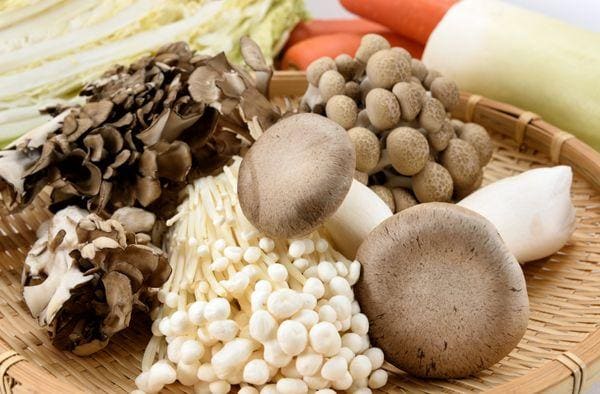5 Mushrooms for Immune Health
The next time you’re taking a walk outdoors, remember that just beneath our feet are massive amounts of mycelial networks which some call “Nature’s Hidden Treasures.” Although not classified as herbs, many of these mushrooms often feature among the abundant variety of herbal supplements availble today.
With such an abundance of health benefits, it can be easy to forget that mushrooms also contain potent immune-supporting phytonutrients like clinically studied beta glucans and vitamin D2 (ergocalciferol). They’re also adaptogenic, which means they help bolster the body’s ability to thrive under stressful situations.
Here are five of the top mushrooms for immune health:
Reishi
Reishi mushrooms are a relatively rare find in nature, so more often than not, you’ll find them cultivated. Fear not: cultivated mushrooms can provide distinct benefits including consistent polysaccharide profiles and the increased ability to capture elusive spores.
Reishi spores are believed to contain a mixture of several long-chain fatty acids that may contribute to the mushroom’s many immunological benefits and contain even more triterpenes than the fruiting bodies.
Turkey Tail
Turkey tail mushrooms grow plentifully on trees in beautifully curved and richly colored concentric circles that resemble turkey tail plumes. They’re also showing up in some of the most exciting modern scientific studies.
Research in animals looks at how this fungi functions as a prebiotic and may benefit immune health by instigating positive changes within the microbiome. Turkey tail polysaccharides PSK and PSP may also support a healthy immune response.1
Lion’s Mane
This unmistakable shaggy mushroom grows wild in North America, Europe and Asia, and naturally contains high amounts of beta glucan polysaccharides and hericenone and erinacine terpenoids.
While promising research suggests potent nervous system health benefits, Lion’s Mane’s bioactive components are also believed to interface with immune cells, particularly those found in the gut, to help regulate the immune system.2
Cordyceps Sinensis
This unique mushroom that looks peculiarly similar to a caterpillar is found only in extremely high-altitude locations. Long honored as a longevity promoting botanical, cordyceps has been used traditionally by both Chinese and Tibetan cultures for centuries to support immune health by enhancing stamina and endurance.
More recent research continues to explore the myriad potential this fungus holds for immune health, including respiratory benefits.3
Shiitake
Probably more popular for its culinary possibilities than its potential for immune health, shiitake has been highly prized in Asia for thousands of years as both a food and for its health-supporting benefits.
One of its many bioactive components is the well-researched polysaccharide lentinan, a type of beta glucan believed to support immune function by stimulating the body’s defenses.4
If you enjoyed reading this article about the five mushrooms for immunity, sign up for Naturespan Health Emails to get more healthy tips, and special deals and promotions on Naturespan Health Products.
About Amy Sunderman, MS, RDDirector of Science & Innovation, Registered Dietitian, Naturespan Health
Amy is a registered dietitian, nutritionist and author with over 20 years of experience in the supplement industry. Amy is passionate about dietary supplements and the health benefits they offer. She enjoys working to find novel nutritional ingredients with strong clinical research behind them to drive innovation and provide health-promoting products to consumers.
*These statements have not been evaluated by the Food and Drug Administration. These products are not intended to diagnose, treat, cure, or prevent any disease.
Sources:
1. Mushrooms as a Potential Source of Prebiotics. Trends in Food Science & Technology. Read source
2. Extracts from Hericium Erinaceus Relieve IBS. Oncotarget. Read source
3. Cordyceps. PubMed. Read source
4. Supplementation with Shiitake. International Journal of Medicinal Mushrooms. Read source





Leave a comment